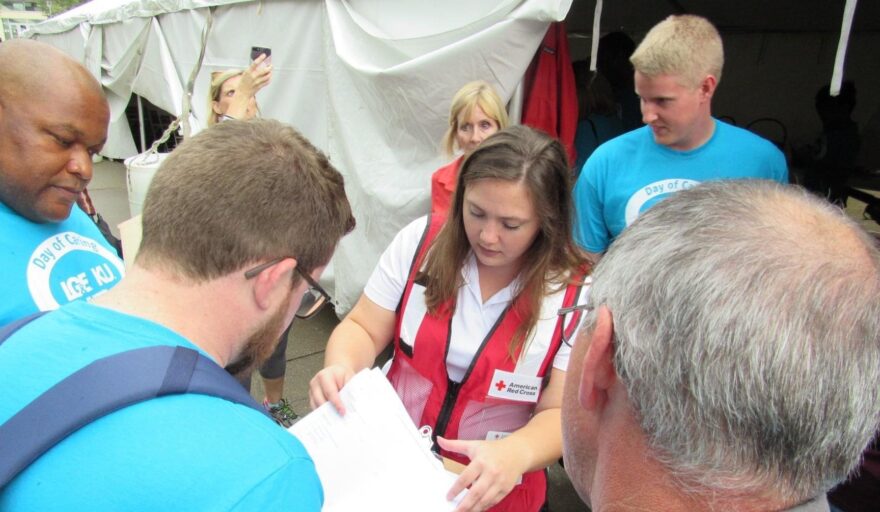Returning—Virtually—to Earn an MSW
Clair Brendel
BSW '15, MSW Student

Clair Brendel works a busy, full-time job for the Red Cross. But, thanks to the School of Social Work’s iMSW (online) program, she is earning her degree from her home in Kentucky.
Clair Brendel’s work in disaster relief with the American Red Cross has taken her to Fayetteville, North Carolina; Ventura, California; Chicago, Illinois; Dayton, Ohio; Kokomo, Indiana; San Juan, Puerto Rico; and Washington, DC. She’s also been to Texas to pilot new software and taught in Philadelphia, Baltimore, and Pasadena.
But she’s earning her MSW from the School of Social Work in her living room in Louisville, Kentucky.
“I hadn’t taken any virtual classes in higher education before my MSW,” says Brendel, who currently serves as regional planning and preparedness manager for the Red Cross. “It’s really opened up the opportunity to come back to a school I love and connect with professionals that I admire without having to uproot and move again. And I found the program to be affordable compared to other schools I was looking at. So, it was a no-brainer in terms of coming back. I am very grateful I got to come back to Illinois for my MSW.”
Deciding to Pursue Her MSW
Brendel, who earned her BSW from the School of Social Work in 2015, decided to pursue her MSW to open up career opportunities in clinical mental health. “I knew I was going to get my MSW sooner or later,” she says. “I had just been waiting to land on what I wanted to do with my MSW.”
When COVID-19 struck, the Red Cross opened a virtual family assistance center with a call-in number for people who had lost loved ones to the disease. “I wanted so strongly to be a part of that team, but I couldn’t do it without an MSW,” Brendel says. While she still enjoyed the planning and management responsibilities in her work, she wanted to be more in the trenches. So, she began looking for the right fit for an MSW program.
She quickly landed on the School of Social Work.
“One of the reasons Illinois was at the top of my list was the research that Dr. Tara Powell has been doing in disaster response and disaster mental health practices,” she says. Powell, an associate professor in the School, is renowned for her research in those areas.
Disaster Relief Experience
Brendel brings a lot of disaster work experience to her work as an MSW student. She was a casework supervisor for the Kokomo Tornadoes and Louisiana flooding in 2016, handled donations for Hurricane Matthew in North Carolina, operated as a planning specialist for Hurricane Maria in the northeast Caribbean the following year, served as chief of staff at the American Red Cross national headquarters, helping to manage five different large-scale disasters at the same time, including a wildfire in Oregon, Typhoon Yutu in the Philippines, Hurricane Michael in the southeastern US, and most recently was a planning manager for the tornadoes that hit Kentucky in December 2021. The last hit close to home—literally.
“The tornado was in Kentucky, which is very much my second home,” she says. “My family has a summer house in western Kentucky. When a disaster hits in your own back yard, it’s very hard to see because you want to go and do all you can to help. But I had to work that one virtually.”
Her seven years of working in disaster response has taught her many lessons, among them that each disaster is unique. In some cases, those differences are cultural. For example, in working Hurricane Maria in Puerto Rico, “it was a huge learning opportunity for me in working with cross-cultural groups. It was good to get the experience with a different culture on a response and engage with local teams that operate a little differently than you’re used to operating. It became very clear that different cultures respond to disasters differently.”
Reigniting an Old Passion
After years of working on the planning and management side of disaster response, she wants to reignite a passion of hers: mental health care.
“Mental health has been a strong passion of mine for years,” Brendel says. “As a teenager, I was diagnosed with ADHD. I had to learn pretty harshly how to deal with my own mental illness and how to stay organized and be productive and how that impacts me and how I can deal with other people.”
To help people with mental health issues in disaster situations, she realized she would need the education and training she is receiving from her MSW program.
“I’m well trained in engaging volunteers, but I can’t get experience from the Red Cross in understanding how to help somebody who’s having a mental health emergency and how to provide that counseling and service for them,” Brendel says.
Brendel has only the internship piece left to finish her MSW. She will intern with the Red Cross and graduate in May 2023. “I’ll be working to practice more of our casework and working with our mental health teams more,” she says.
From there, she will embark on a new chapter in her social work career: helping those with mental health crises in the wake of disasters.